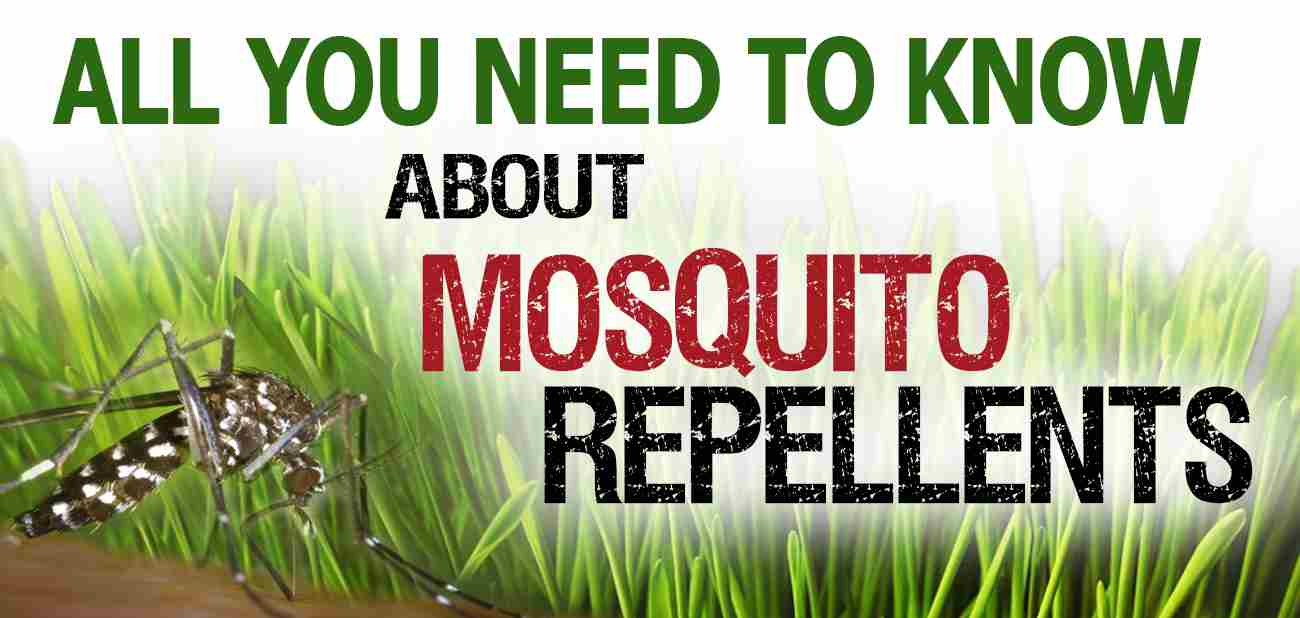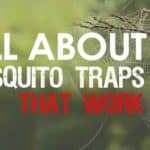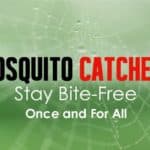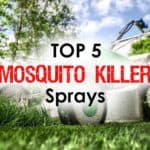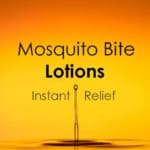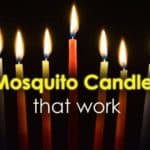Imagine you visit a place where hundreds of mosquitoes are buzzing around – and you don’t get bitten by them.
No more itchy bites and burning melts that annoy you. This guide is going to show you a remarkable way to stop swarming mosquitoes from harassing you:
- Mosquito repellents protect you and your family from dangerous diseases.
- Whether you are out in the woods or just having a BBQ in the yard, they are an unbeatable tool to prevent little critters.
While the best way to avoid bug bites is to stay outside of infested areas that’s not always feasible. There are mosquitoes in all 50 states of the USA, especially near lakes and standing waters. Fortunately there is a wide range of repellents available to prevent diseases like West Nile or Zika.

- Very effective against mosquitoes and bugs
- Dries fast without a greasy screen
- 25% DEET is enough in most situations
Last update on 2025-09-16 / Affiliate links / Images from Amazon Product Advertising API
They are often sold as sprays or lotions which get applied on exposed skin.
- Contrary to popular belief these products don’t kill mosquitoes but they make you unattractive for their sensory system.
- Therefore they’ll still land on your arm but they won’t bite you.
Based on the length of your trips and the number of mosquitoes there are different solutions for every user.
I’ve reviewed the top rated sprays on the market to give you an overview about the different types and the best mosquito repellents in each category.
Which mosquito repellents work best?
I categorized all the stuff that works into three groups. Feel free to click on the buttons to directly jump to each of them or just continue reading if you want to know which one is the best.
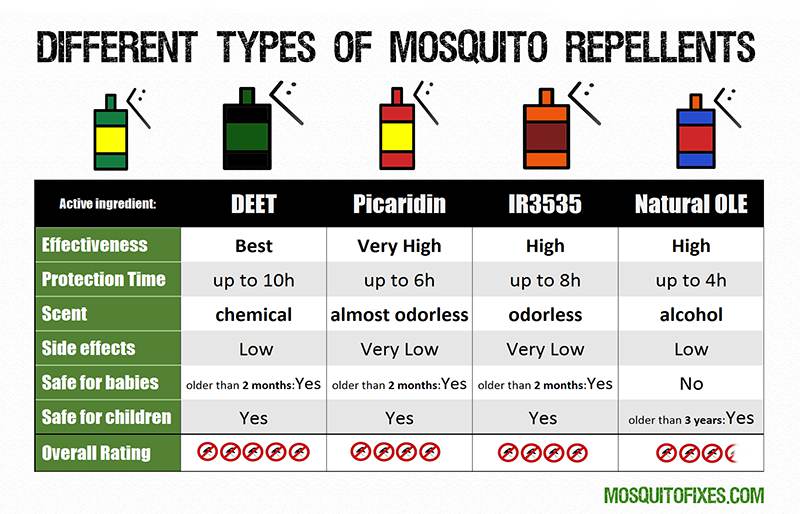
Sprays with DEET
Ever since it has been invented DEET became the number one choice for Americans who want to protect themselves from bug bites.
Nowadays around 30% of the population use this active ingredient to prevent dangerous diseases carried by mosquitoes and other nasty insects.
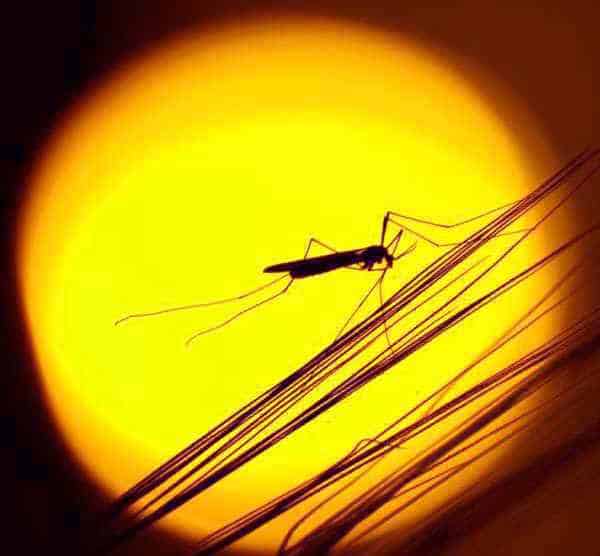
Numerous scientific studies have proven that mosquito repellents with DEET are very effective for personal mosquito control.
Once applied on exposed skin it keeps the little bloodsuckers and other carriers of diseases at bay. Depending on the concentration the protection lasts up to 10 hours. That’s enough for hiking trips or camping with the family.
DEET is the most effective and widely used insect repellent with an estimated 200 million annual applications worldwide.1
Safety for adults and children
While DEET can cause some side effects like skin reactions it is widely considered safe by scientists and the EPA.
It can even be used for children2,3,4. Read more about it here: Is DEET harmful to humans?.
As long as you apply correctly it’s not nearly as harmful as the potential risk from insect bites. DEET can be used on skin and non-synthtetic clothes like cotton t-shirts.

If you try it out once you’ll know that this stuff just works. Period.
I regularly use sprays with DEET myself for outdoor activities as well as trips to other countries and I have yet to find an alternative that can beat these products. They effectively get rid of mosquitoes, gnats and ticks. Even during a safari in Africa they helped to repel all sorts of harmful insects.
In my opinion you should stick to this sort of spray as it’s considered the best solution against mosquito bites currently available.
What Mosquito Repellents you should use
Repellents usually contain between 5% and 98% DEET. Concentrations above 20% do not necessarily provide better, but longer lasting protection.
- A low amount of the active ingredient DEET might only last 90 minutes while 100% lasts up to 10 hours.
- Highly concentrated repellents can increase the risk of side effects however, so you should generally avoid them if you are only visiting low risk vectors.
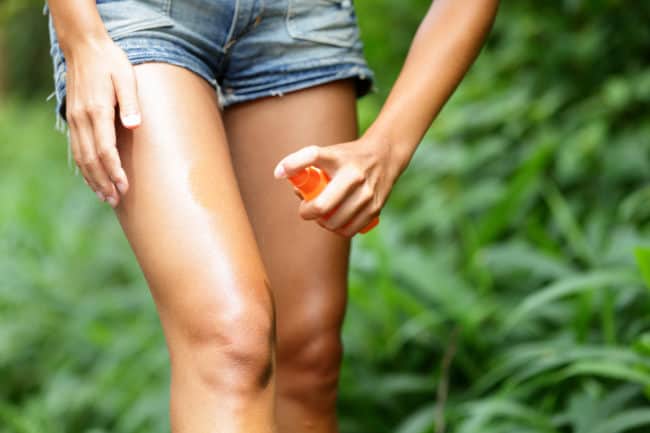
Tip: Don’t forget that the exact protection time depends on a lot of things. Besides the amount of DEET it’s also affected by your sweat, air temperature, activity and many other factors.
From my experience you don’t need sprays with more than 20-30% DEET for normal day trips like hiking.
- They last around 5h so before the effect wears off you can reapply the spray in most situations.
- If you want to stay on the safe side when visiting high risk areas you can go with a higher concentration.
The Center of Desease Control recommends repellents in the 20% to 50% range too5.
Top3 mosquito sprays with DEET reviewed
Check out this list of great mosquito repellents:
Cutter Backwoods Dry 25-Percent DEET
If you need a field-tested spray for everyday activities look no further. Here it is:

- Very effective against mosquitoes and bugs
- Dries fast without a greasy screen
- Smells better than most sprays
Last update on 2025-09-16 / Affiliate links / Images from Amazon Product Advertising API
A well-balanced repellent which is suitable for most occasions. The active ingredient helps you to stay bite-free in your yard as well as in the woods. Cutter Backwoods Dry can effectively fight off mosquitoes. Once applied they won’t bother you anymore.
A special feature is the spray’s dry texture. After treating your skin with it the spray dries considerably faster than other products. Everyone who doesn’t like the stickiness of other sprays should try it out!
It’s worth mentioning that the scent is okay and not off-putting. While it can’t compare to perfume you won’t notice Cutter Backwoods Dry after some time. Overall I’m very satisfied with this spray and it’s my everyday pick when I head outdoors.
It’s the best anti mosquito spray for everyday activities like BBQ with friends or camping with your family.
Repel 100 Insect Repellent – 98% DEET
You need something stronger that feels more like revenge? Then I’ve got something for you.

- Incredibly effective against mosquitoes and other bugs
- For high risk, heavily infested areas
- Lasts long and reliably
Last update on 2025-09-16 / Affiliate links / Images from Amazon Product Advertising API
A high-concentrated spray with 98% DEET. It’s overkill for many activities but in high risk areas I use this spray. It drives away not only mosquitoes but also other insects like the Florida deer fly.
The protection is long-lasting for up to 10h, not many other products on the market can compare to that. Repel 100 is best used for places with hordes of little bloodsuckers that can threaten your health with diseases.
Otherwise you better opt for a solution with less DEET. Not only will the risk of side effects decrease but it might be less aggressive on your synthetic materials. Repel 100 is powerful enough to decompose plastic, leather or paint.
Be careful with this repellent as it is very effective! My favorite for high risk vectors.
OFF! Deep Woods Insect Repellent
A classic mosquito repellent and a good alternative to the spray above. While its texture is stickier it also helps to keep the screen longer on your skin when you sweat.

- Effective against mosquitoes, ticks and other bugs
- Ideal for short and medium trips
- Convenient spray mechanism
Last update on 2025-09-16 / Affiliate links / Images from Amazon Product Advertising API
While the smell is not very pleasant Deep Woods Off’s 4 ounce bottle compensates for this flaw with an excellent spray mechanism. Whether you to treat your skin or your clothes it keeps going.
Recommended because it works exactly when you need it!
Tip: What is effective for others might not work for you. While DEET helps against all types of mosquitoes, additional ingredients or your skin can interfere with its protective features. In rare cases you might have to switch to another product.
Other types of mosquito sprays
Are you still eager to learn more about mosquito sprays? Great, I’ve got even more choices for you!

Besides DEET there are 2 other synthetic repellents registered with the EPA:
Picaridin and IR3535 (if you think this is a complicated name try the full one: Ethyl butylacetylaminopropionate).
In case you experience negative side effects with DEET then you might want to try out one of these first. Synthetic active ingredients tend to protect longer and more reliably than natural mosquito repellents6.
Picaridin vs. DEET
Picaridin is the newest alternative to DEET and concentrations of 20% seem to work as effective as repellents with the same amount of DEET7. It’s considered a viable alternative and is used worldwide, especially in Europe and Australia.
Furthermore it’s odorless and it might have less side effects. It’s not harmful to synthetic fabrics and its texture is less greasy.
Overall this active ingredient is a strong competitor to the established DEET because it has some clear advantages on its side. So why Picaridin isn’t considered the best ingredient for insect repellents?
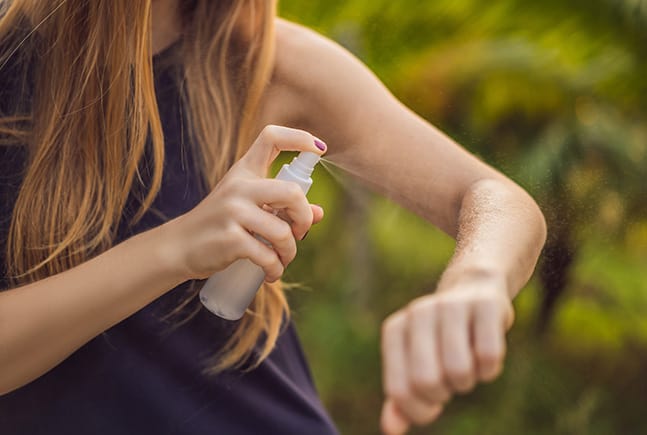
Because DEET has a stronger body of research since it has been available for over 50 years. In comparison the long-term effects of Picaridin are not clear yet8. Scientists as well as the government need more time to study about the possible outcomes and risks.
This has led to a stronger regulation in the US that affects consumers directly: while Picaridin helps against mosquitoes it is currently only available in concentrations of up to 20%.
I personally stick to sprays with DEET for now because they are proven to be very effective and you can buy them in higher concentrations as well. More percentage usually means more protection time so I continue to use DEET.
That said if you experience negative side effects with other repellents or you don’t need high concentrations then Picaridin might be the right choice for you. There are a number of products available with it that have a better scent than most DEET sprays.
Best Spray with Picaridin: Sawyer Products SP544 Premium 20%
This spray is a great replacement for lower concentrated repellents with DEET.

- With 20% Picaridin – no DEET
- Less greasy and not so oily
- Smells very okay
Last update on 2025-09-16 / Affiliate links / Images from Amazon Product Advertising API
The active ingredient Picaridin might cause less side effects and is definitely not as greasy on the skin as most other products.
In addition it also smells better so it’s the right choice for everyone who can’t stand DEET. However be aware that in my experience the spray only last around 3-4h because of its low concentration.
If you go to high risk areas you should look for a stronger repellent. From my experience you also have to cover everything thoroughly with Picaridin or the little beasts will find you. Even if you only miss a small area of your exposed skin. DEET’s application seems a bit more forgivable in this regard.
IR3535 vs. DEET
Another contestant is IR3535, a chemical that performed similar to DEET9. Some studies suggest though that it might be less effective for the mosquito type that carries Malaria10.
During my use of products with IR3535 I noticed that they smell way more pleasant than repellents with DEET. Additionally they don’t leave a greasy screen on your skin and clothes. Therefore this active ingredient might be the right choice for you if you can’t stand the scent of ordinary DEET sprays.
Best Spray with IR3535: Coleman Skin Smart DEET-Free Spray
This spray is a great replacement for lower concentrated repellents with DEET.
No products found.
As mentioned before this repellent with IR3535 is almost odorless and dries way faster than most other competitors. It lasts around eight hours and keeps all sorts of mosquitoes encountered in the Everglades at bay.
In comparison to DEET this spray needs to be applied more carefully.
If you miss a spot the mosquitoes will find it. While it might not be a full replacement for DEET it still can be a viable alternative for many scenarios. Everyone in need of a spray without DEET can take a closer look.
Permethrin
Didn’t I mention just 2 DEET alternatives before? Well, technically Permethrin is an insecticide and should only be used on clothes but not skin.
This is a complete guide about all sorts of personal mosquito repellents so I mention it because it’s long lasting and effective. If you ever need to stay out in the jungle for some time don’t forget you’ve read this paragraph.
Natural Mosquito repellents
If you’re reading this I guess that means that you still don’t know what mosquito repellent is the best for you. To give you some orientation here is a small summary of my recommendations so far:
In my opinion DEET is the safest bet in regard to mosquito repellents. If you suffer from side effects you can also consider other synthetic compounds like Picaridin.
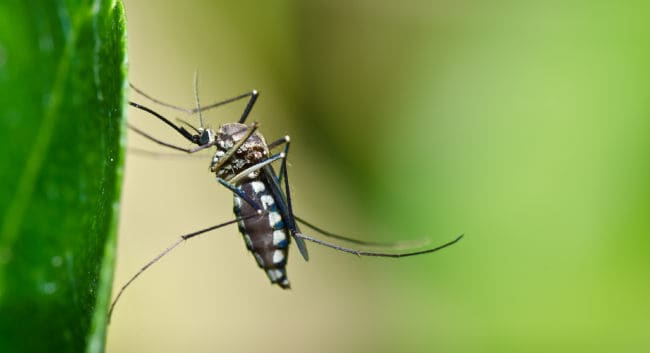
If you’re in doubt I recommend that you try out one of the sprays listed above because from my experience they tend to work best. They are all great choices and protect you in a scientifically proven way.
As mentioned before synthetic repellents usually work more reliably and longer than natural mosquito repellents. That said, there’s still one option for everyone who wants to stick to natural solutions. The following ingredient can be the right pick for you:
A natural DEET alternative
Oil of lemon eucalyptus (OLE) is registered with the EPA because it has been scientifically proven to be effective against mosquito bites11. Keep in mind though that plant based sprays usually last shorter so be diligent to reapply them frequently.

The stuff that makes Oil of lemon eucalyptus work is called p-menthane-diol (PMD). This compound can also be derived synthetically so make sure that you buy genuine plant based natural products. In higher concentrations it can also help to get rid of ticks12.
From my experience natural sprays can be a good alternative for those who suffer from DEET side effects. They tend to work in most cases however occasionally they fail. If you are frequently visiting high risk areas the natural repellents’ protection might not be enough for you.
I would recommend that you rely on a fallback option because OLE products tend to work less reliable than synthetic ones. While they fight off mosquitoes in the Louisiana marshes they might not fit for your trip to Mexico.
In contrast to DEET-based products Oil of lemon eucalyptus is not recommended for children under 3 years. From my experience many OLE sprays also contain a lot of alcohol so better stick to another option for your younger ones.
Best Natural Spray: Repel Lemon Eucalyptus Natural Insect Repellent
A famous DEET-free spray with Oil of lemon eucalyptus. During my observations it worked comparable to lower concentrated amounts of DEET.

- Viable alternative to low %-DEET
- Suitable for all fabrics
- For short and medium trips
Last update on 2025-09-16 / Affiliate links / Images from Amazon Product Advertising API
Protection lasted around 3.5 hours. Therefore it might be a viable alternative for everyone who wants to avoid unpleasant side effects. You can also treat all kinds of clothes with it so it has some serious advantages over other repellents.
Be aware though that the active ingredient is a bit less reliable. While it can work in some areas it might not work in others. That’s why I recommend that you always have another repellent at hand. In my opinion risking some minor side effects is preferable to hundreds of dangerous mosquito bites.
Be aware that this spray is not recommended for children under 3. It not only contains OLE but 45% ethanol as well. So be careful when you apply it and spare damaged skin and your eyes.
Other types of personal mosquito control
All scientifically proven and personally recommended mosquito repellents have been mentioned before. The following options could work in some cases but be aware that you put yourself at risk.
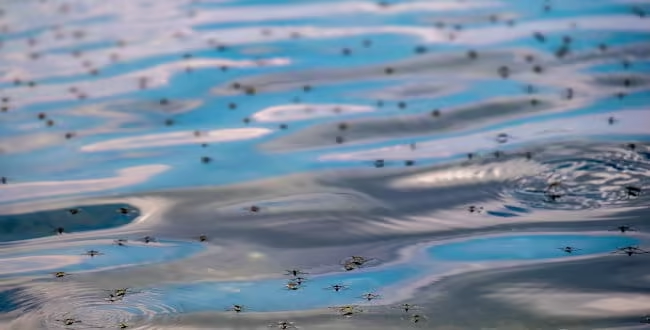
Rather than becoming a guinea pig you are better off trying any of the top rated spays mentioned above. At least one of them will work.
Some of them could cause side effects but in my opinion that’s way better than getting bitten by hordes of mosquitoes possibly carrying dangerous diseases.
Citronella oil
It can work for short amounts of time (<2h). However its effect is considered very volatile depending on the formulation13 and sometimes also the oil’s age.
This means that you can’t rely on it if you visit high risk mosquito vectors. In case you just want to fight off a bug here and there it could be okay.
I recommend more reliable repellents though.
Neem
The vegetable oil of neem (Azadirachta indica) may provide protection but also has some side effects like skin irritation. There are some additional safety concerns about its long-term toxic effects14.
Other plant oils
Many products on the market contain a mix of essential oils from different plants.
According to scientific studies some of them can help to prevent mosquitoes from biting you.
However the effectiveness is based on formulation, age and other factors. This means that they’re not reliable(in case someone messes up the mix). Therefore using those puts yourself at risk.
Vitamin B
They are a vital component of our body but taking additional vitamins doesn’t help against mosquitoes. There is no scientific proof that this stuff works15. Makes it easy to spot a fraud though if someone recommends you expensive pills.
Garlic
Okay, you’ve read this entire list. You already know that it’s useless against mosquito bites16.
Conclusion
Thank you for reading this extensive guide on mosquito repellents. I hope you learned enough about the different types of mosquito sprays and when to use them.
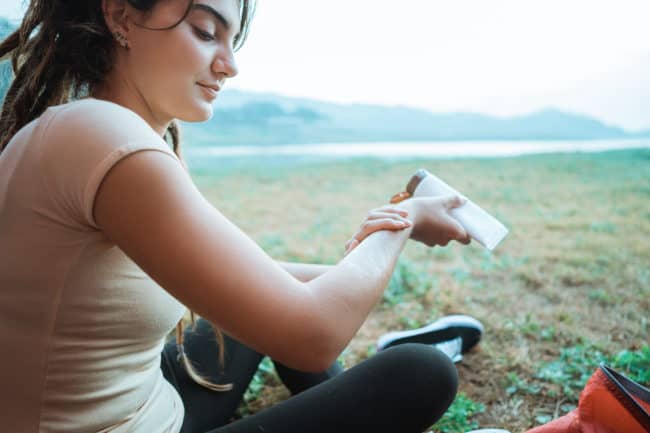
It can be a bit overwhelming to read about numerous different chemicals and their effectiveness. Don’t let yourself be discouraged by the wide range of choices.
If you’ve never used a mosquito spray before I recommend that you start with a DEET-based one.
While it has flaws and side effects it is widely considered the best and safest option that we currently have.
You can also look out for the synthetic alternatives.
Even natural repellents can keep you safe, just be sure that you apply them correctly. If you have any other questions just browse the rest of this site. It contains a lot of useful information in regard to mosquito control.
Sources
- Chen-Hussey et al.; licensee BioMed Central Ltd. 2014. Assessment of methods used to determine the safety of the topical insect repellent N,N-diethyl-m-toluamide (DEET), Parasites & Vectors 2014, 7:173. http://parasitesandvectors.biomedcentral.com/articles/10.1186/1756-3305-7-173
- https://www.epa.gov/insect-repellents/deet#safety
- McGready R et al. 2001. Safety of the insect repellent N,N-diethyl-M-toluamide (DEET) in pregnancy. Am J Trop Med Hyg. 2001 Oct;65(4):285-9. http://www.ncbi.nlm.nih.gov/pubmed/11693870?dopt=Abstract&holding=f1000,f1000m,isrctn
- https://www.aap.org/en-us/about-the-aap/aap-press-room/aap-press-room-media-center/Pages/Insect-Repellents.aspx
- http://www.cdc.gov/westnile/faq/repellent.html
- Goodyer, LI PhD et al. Expert Review of the Evidence Base for Arthropod Bite Avoidance, Journal of Travel Medicine, Volume 17, Issue 3, May 2010. http://jtm.oxfordjournals.org/content/17/3/182.article-info
- Source 6.
- Source 6.
- Frances SP, Mackenzie DO, Rowcliffe KL, Corcoran SK. 2009. Comparative field evaluation of repellent formulations containing DEET and IR3535 against mosquitoes in Queensland, Australia. J Am Mosq Control Assoc. 2009, 25: 511-513. 10.2987/Moco-09-5938.1. http://www.bioone.org/doi/abs/10.2987/Moco-09-5938.1
- Source 6.
- http://wwwnc.cdc.gov/travel/yellowbook/2016/the-pre-travel-consultation/protection-against-mosquitoes-ticks-other-arthropods
- http://www.mosquito.org/repellents
- Source 6.
- Boeke SJ, Boersma MG, Alink GM, et al. 2004. Safety evaluation of Neem (Azadirachta indica) derived pesticides. J Ethnopharmacol 2004; 94:25–41. http://www.sciencedirect.com/science/article/pii/S0378874104002491
- Ives AR, Paskewitz SM. 2005. Testing vitamin B as a home remedy against mosquitoes. J Am Mosq Control Assoc 2005; 21:213–217. http://www.ncbi.nlm.nih.gov/pubmed/16033124?access_num=16033124&link_type=MED&dopt=Abstract
- Rajan TV, Hein M, Porte P, Wikel S.A. 2005. Double‐blinded, placebo‐controlled trial of garlic as a mosquito repellent: a preliminary study. Med Vet Entomol 2005; 19:84–89. http://www.ncbi.nlm.nih.gov/pubmed/15752181?access_num=15752181&link_type=MED&dopt=Abstract
Hi! My name is Mark and I’m an outdoor freak.
Visiting many exotic places around the world allowed me to gain some knowledge about effective mosquito control. That’s why I decided to start this site and give you in-depth reviews regarding the best repellents and traps.
And yes, you may call me Mosquito Mark.
